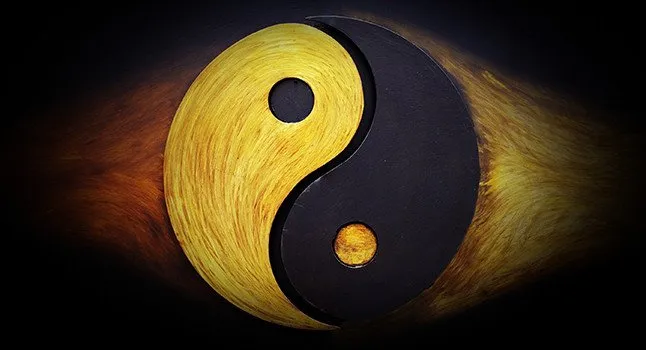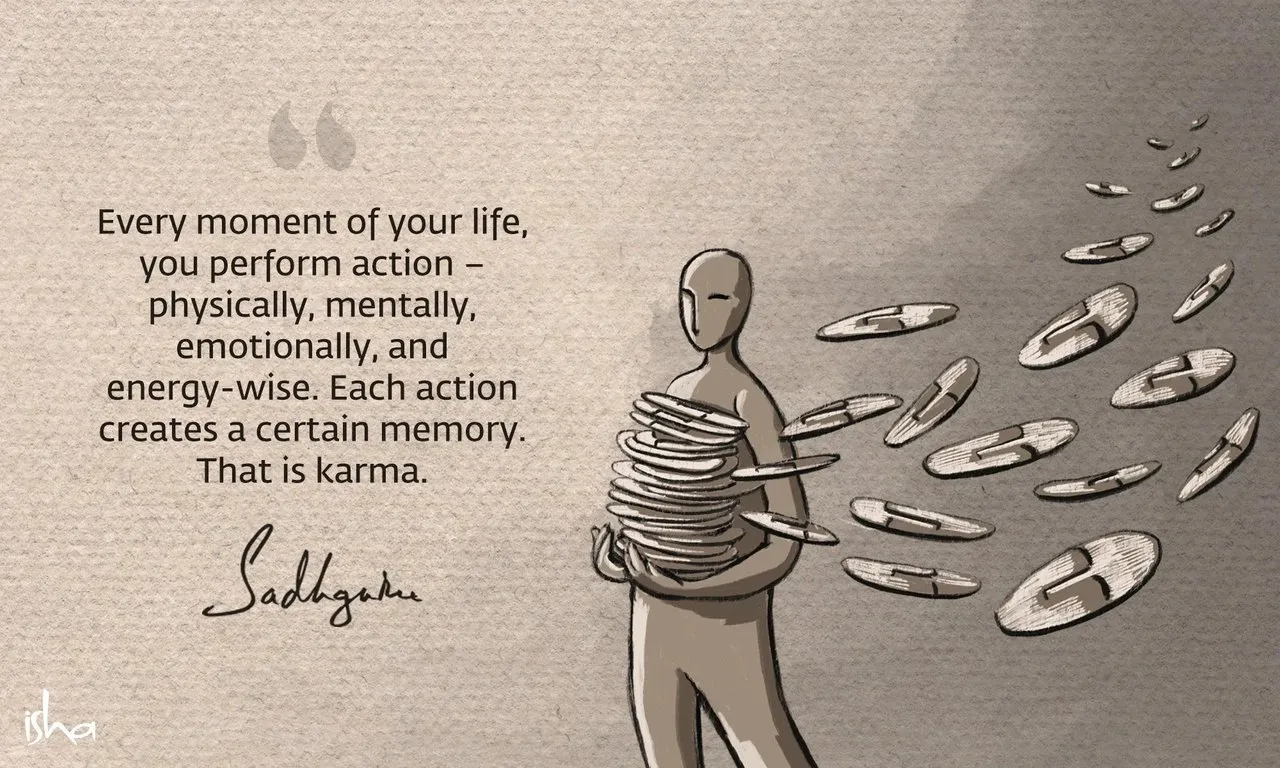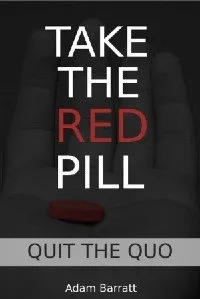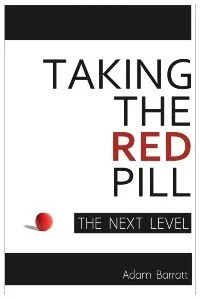What goes around comes around… treat unto others… reap what you sow… it all comes home to roost… law of attraction… cause and effect… etc…
Karma.
This was originally an Indian religious concept. The concept of ‘action’ or ‘deed’ understood as that which causes the entire cycle of cause and effect. It’s a prevalent and underlying theme in Hindu, Buddhism and Sikh philosophies and many others I’m sure. But it has come to be a well known term amongst all people that you will get back what you give out… in some way, eventually.

If you take the deeper concept then it could be in another life or existence but at the human level between everyday people it is thought or perhaps hoped that things will even themselves out… the yin and the yang will be kept in balance.
It’s quite often used colloquially in a negative sense. If someone does something bad then people will cite karma in that they will get what they deserve. This may or may not be true but there is a deeper issue at hand.
Whether you believe in karma and whether you think that everything does even itself out over time, there is a lot of merit to the idea and life should be lived in such a way to acknowledge it.
I think karma is playing it’s way out all round us all the time, in subtle ways. It’s not an instant thing and it’s not a straight transaction… it is wider and more intricate. Who knows if we have lived before and if we will live again after this life and in what form and what factor karma has on all that.
So, all the unknown aside (science will never be able to explain everything anyway… people have to follow their own path and become more enlightened), karma for our purposes is summed up as ‘what goes around comes around’.
So send out the right thoughts and actions and it will come back to us. It’s important for us not to expect it to come back to us, but just know in simply doing that good deed you have received some form of payback, and if everyone is living by the same principle then it will be circling everywhere.
One of the most beautiful compensations in life is that no man can help another without helping himself - Ralph Waldo Emerson
Thing is, whether you believe in God or conspire to any religion on belief system it doesn’t matter. It will bite you on the bum or reward you depending on the route or decision you have chosen.
And you need to be aware that following each thought or action, there is left an imprint on you somewhere and and on some level. Even if consciously you’ve put it out of your head, a mark will have been left on your subconscious, deep in your psyche or in your heart or soul and you will be aware of it at some level and it will effect you.
Forget ‘God’ or anyone else keeping score for heaven or reincarnation purposes… the payoff or punishment you will put on yourself and receive from the universe, however the intricacies work, is of more pressing concern.
Never underestimate the value of a kind word…
Think about it. Everything you say and do can have a massively profound effect whether you know it or not. A brief interaction can hugely influence a person’s day or indeed life, so make it count.
Always try and leave each situation a little better then when you found it. This is a worthy goal of anyones undertaking. Not only are you putting out the right energy, you are attracting it too.

I’m reminded of an email I received from somewhere with a story entitled ‘Heart of a Teacher’.
A teacher’s influence is massive as they help shape the minds of young learners. Most people disliked most teachers at school, lets be honest. Not because we were naughty, but because as an adult now I can safely say these people were poor at their jobs with a bad attitude to boot.
This story tells a far more inspiring picture. Uplifting and a little sad. Certainly something to think about…
He was in the first third grade class I taught at Saint Mary's School in Morris, Minnesota. All 34 of my students were dear to me, but Mark Eklund was one in a million. Very neat in appearance, he had that happy-to-be-alive attitude that made even his occasional mischievousness delightful.
Mark talked incessantly. I had to remind him again and again that talking without permission was not acceptable. What impressed me so much, though, was his sincere response every time I had to correct him for misbehaving. "Thank you for correcting me, Sister!" I didn't know what to make of it at first, but before long I became accustomed to hearing it many times a day.
One morning my patience was growing thin when Mark talked once too often, and then I made a novice teacher's mistake. I looked at Mark and said, "If you say one more word, I am going to tape your mouth shut!" It wasn't ten seconds later when Chuck blurted out, "Mark is talking again." I hadn't asked any of the students to help me watch Mark, but since I had stated the punishment in front of the class, I had to act on it.
I remember the scene as if it had occurred this morning. I walked to my desk, very deliberately opened my drawer and took out a roll of masking tape. Without saying a word, I proceeded to Mark's desk, tore off two pieces of tape and made a big X with them over his mouth. I then returned to the front of the room. As I glanced at Mark to see how he was doing, he winked at me. That did it! I started laughing. The class cheered as I walked back to Mark's desk, removed the tape, and shrugged my shoulders. His first words were, "Thank you for correcting me, Sister."
At the end of the year, I was asked to teach junior-high math. The years flew by, and before I knew it Mark was in my classroom again. He was more handsome than ever and just as polite. Since he had to listen carefully to my instruction in the "new math," he did not talk as much in ninth grade as he had in third. One Friday, things just didn't feel right. We had worked hard on a new concept all week, and I sensed that the students were frowning, frustrated with themselves and edgy with one another. I had to stop this crankiness before it got out of hand. So I asked them to list the names of the other students in the room on two sheets of paper, leaving a space between each name. Then I told them to think of the nicest thing they could say about each of their classmates and write it down.
It took the remainder of the class period to finish their assignment, and as the students left the room, each one handed me the papers. Charlie smiled. Mark said, "Thank you for teaching me, Sister. Have a good weekend." That Saturday, I wrote down the name of each student on a separate sheet of paper, and I listed what everyone else had said about that individual.
On Monday I gave each student his or her list. Before long, the entire class was smiling. "Really?" I heard whispered. "I never knew that meant anything to anyone! I didn't know others liked me so much." No one ever mentioned those papers in class again. I never knew if they discussed them after class or with their parents, but it didn't matter. The exercise had accomplished its purpose. The students were happy with themselves and one another again.

That group of students moved on.
Several years later, after I returned from vacation, my parents met me at the airport. As we were driving home, Mother asked me the usual questions about the trip, the weather, my experiences in general. There was a lull in the conversation. Mother gave Dad a sideways glance and simply said, "Dad?" My father cleared his throat as he usually did before something important. "The Eklunds called last night," he began. "Really?" I said. "I haven't heard from them in years. I wonder how Mark is." Dad responded quietly. "Mark was killed in Vietnam," he said. "The funeral is tomorrow, and his parents would like it if you could attend." To this day I can still point to the exact spot on I-494 where Dad told me about Mark.
I had never seen a serviceman in a military coffin before. Mark looked so handsome, so mature. All I could think at that moment was, "Mark, I would give all the masking tape in the world if only you would talk to me." The church was packed with Mark's friends. Chuck's sister sang "The Battle Hymn of the Republic." Why did it have to rain on the day of the funeral? It was difficult enough at the graveside. The pastor said the usual prayers, and the bugler played taps. One by one those who loved Mark took a last walk by the coffin and sprinkled it with holy water. I was the last one to bless the coffin. As I stood there, one of the soldiers who acted as pallbearer came up to me. "Were you Mark's math teacher?" he asked. I nodded as I continued to stare at the coffin. "Mark talked about you a lot," he said.
After the funeral, most of Mark's former classmates headed to Chuck's farmhouse for lunch. Mark's mother and father were there, obviously waiting for me. "We want to show you something," his father said, taking a wallet out of his pocket. "They found this on Mark when he was killed. We thought you might recognize it." Opening the billfold, he carefully removed two worn pieces of notebook paper that had obviously been taped, folded and refolded many times. I knew without looking that the papers were the ones on which I had listed all the good things each of Mark's classmates had said about him. "Thank you so much for doing that," Mark's mother said. "As you can see, Mark treasured it."
Mark's classmates started to gather around us. Charlie smiled rather sheepishly and said, "I still have my list. I keep it in the top drawer of my desk at home." Chuck's wife said, "Chuck asked me to put his in our wedding album." "I have mine too," Marilyn said. "It's in my diary." Then Vicki, another classmate, reached into her pocketbook, took out her wallet and showed her worn and frazzled list to the group. "I carry this with me at all times," Vicki said without batting an eyelash. "I think we all saved our lists." That's when I finally sat down and cried. I cried for Mark and for all his friends who would never see him again.
The density of people in society is so thick that we forget that life will end one day. And we don't know when that one day will be. So please, tell the people you love and care for that they are special and important. Tell them, before it is too late.
by Paula Fox
And with that, let's wrap this whole shebang up in the final chapter!

Take the Red Pill, Quit the Quo
Book written by Adam Barratt, 2011
Chapter 1: The Status Quo
Chapter 2: Who Am I?
Chapter 3: The Dream Chasing Paradox
Chapter 4: And… Action!
Chapter 5: Decisions, Decisions
Chapter 6: Priorities
Chapter 7: Discipline, Attitude & Patience
Chapter 8: Persistence
Chapter 9: Fear of Criticism
Chapter 10: Kaizen
Chapter 11: Blue Pill Heads & The Not Much Crowd
Chapter 12: Karma
Chapter 13: Rally Call & Final Word

Taking the Red Pill – The Next Level
Book written by Adam Barratt, 2012
Chapter 1: Now Where Were We?
Chapter 2: Routines & Habits
Chapter 3: Perfectionism Plague
Chapter 4: Gossips & Whingers
Chapter 5: Gratitude & Reframing
Chapter 6: Fear Fairies
Chapter 7: Simplify, Minimise, Zen
Chapter 8: You're Not Normal
Chapter 9: Closing
